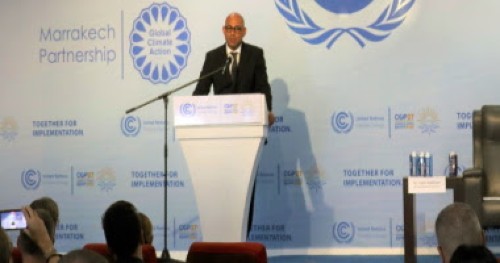UN Emphasizes the Importance of Limiting Global Warming to 1.5 Degrees Celsius
SHARM EL-SHEIKH, Egypt –The United Nations Climate Change (UNFCCC) Executive Secretary, Simon Stiell Tuesday stressed the importance of curbing global warming to 1.5 degrees Celsius, saying that it is a goal set by the Paris Agreement but also grounded firmly in science and hard data.
 UN Climate Change Executive Secretary (UNFCCC), Simon Stiell, addresses an Emission Gap Report event at COP27 (UNIC Tokyo)“Anything beyond a 1.5 rise increases the risks to health, livelihoods, food security, water supply, human security and economic growth. For many, it is already a living hell… every fraction of a degree beyond 1.5 increasingly puts human life on this planet in peril,” he told the ongoing UN Climate Change Conference (COP 27), calling on countries to be “rigorous” in their efforts to uphold their commitments in the Glasgow Climate Pact to keep 1.5 in sight.
UN Climate Change Executive Secretary (UNFCCC), Simon Stiell, addresses an Emission Gap Report event at COP27 (UNIC Tokyo)“Anything beyond a 1.5 rise increases the risks to health, livelihoods, food security, water supply, human security and economic growth. For many, it is already a living hell… every fraction of a degree beyond 1.5 increasingly puts human life on this planet in peril,” he told the ongoing UN Climate Change Conference (COP 27), calling on countries to be “rigorous” in their efforts to uphold their commitments in the Glasgow Climate Pact to keep 1.5 in sight.
The former Grenada government minister had on Monday called on parties to “bridge the divide” in Sharm el-Sheikh to ensure rapid action on mitigation, adaptation, loss and damage finance and accountability, encouraged nations to come out with “substantive positions” to move forward on these issues.
On Tuesday, the UN climate chief noted positively that South Africa has launched a multimillion-dollar plan to shift from coal towards green energy, calling it a key moment in the global push for the transition away from fossil fuels.
“We anticipate hearing more ambition in this area when G20 ministers meet this week in Bali. So, we are making headway at COP27, but moving further and faster also means action beyond COP to drive down emissions,” Stiell said.
At the G20 in Bali, a coalition of countries, led by the United States and Japan, announced that they will be investing US$20 billion to sharply reduce Indonesia’s reliance on coal and to transition the Southeast Asian nation to renewable power.
Currently, Indonesia is one the world’s largest consumers of coal and the world’s fifth largest greenhouse emitter.
Meanwhile, the energy sector, responsible for more than two-thirds of global greenhouse emissions, is mainly powered by fossil fuels. While this brings electricity and transport to most of the world, it is accompanied by deep pain and loss to vulnerable communities and ecosystems.
According to the International Renewable Agency (IRENA), only 29 percent of global electricity generation currently comes from renewables, and carbon emissions continue an upward trend.
“We’ve barely scratched the surface. And the one year since Glasgow, frankly, has been a year of climate procrastination. By 2030, we need to reduce emissions by between 30 to 45 percent, but since COP26 we’ve shaved off one percent. So, we have a long way to go,” the UN Environmental Program (UNEP) chief, Inger Andersen, told an event at the site of this year’s UN-facilitated climate talks.
. Andersen noted that “we currently live in a world that has warmed 1.1 degrees Celsius since the preindustrial era, and we are already seeing an increase in storms, droughts, floods, and crop failures.
“The current policies take us to a 2.8 degrees world…It is important that we have a conversation about emissions reduction and who carries the load. The G20, which are meeting this very week… have a collective responsibility for 75 percent of all emissions,” she underscored, asking for these economies to invest in climate finance and “climate justice”.
On Monday night, the COP27 Presidency released a document containing the summary of possible elements put forward by parties for inclusion in the conference’s final outcome, which is expected to be drafted by Wednesday.
The document contains items of interest expressed by parties related to mitigation, adaptation and loss and damage, among many other issues.
On the loss and damage agenda, the top issue this year pushed by developing countries including the Caribbean, the Presidency released a draft text on Tuesday, which includes matters related to finance with various options, one of them creating a new financial mechanism.
“Pledges to reduce emissions, to improve adaptation measures, to repair loss and damage, and pledges to increase financing – all need to be put into action,” the President of the current session of the UN General Assembly, Csaba Kőrösi, told delegates on Tuesday.
Kőrösi reminded them that COP27 is “the implementation COP” and said that it was the moment to bridge the gaps between pledges and fulfilment. He also called on delegates to ask themselves if “the glass will be half full or half empty” by the end of the conference.
“The glass will be full when we fulfil our pledges and use the solutions we already have. This glass will be full when we overcome procedure debates and can fully focus on how to address transformation to a water and climate safe development path. So let it be a full glass,” he urged.


